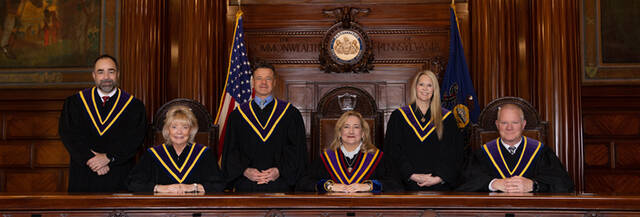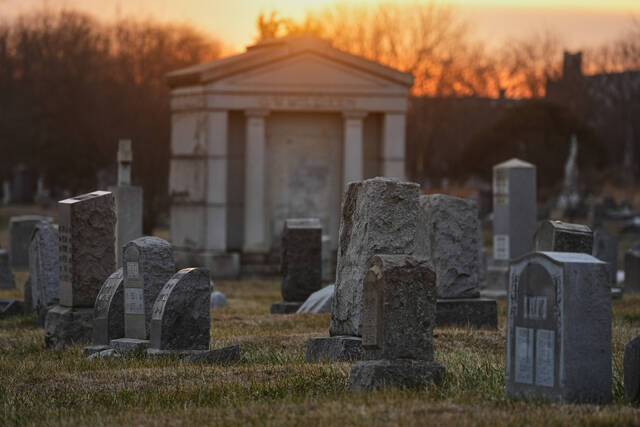Abortion rights advocates Monday praised a state Supreme Court opinion that they believe will ultimately uphold a broad constitutional right to abortion in Pennsylvania, even as the justices remanded the narrow merits of the case back to a lower court.
The complicated set of five concurring and dissenting opinions spanning more than 300 pages does not decide the issue at the heart of the case: whether the state’s ban on Medicaid paying for abortions is unconstitutional.
But the language used in the majority opinion — that the ban is “presumptively unconstitutional” — indicates that the justices think it is, experts said.
“The court is clearly signaling what it wants the Commonwealth Court to do,” said Widener University constitutional law Professor Quinn Yeargain. “The court wants the Commonwealth Court to strike down this law.”
In its 3-2 decision Monday, the court overturned a unanimous 1985 case known as Fischer, which found that the Medicaid abortion ban was not based on sex and therefore did not discriminate against women.
Women’s Law Project co-executive director Susan J. Frietsche, who argued the current case on behalf of a group of seven abortion providers, said it portends a huge win for reproductive rights.
“I know what the Constitution says, and in light of this morning’s ruling, I can’t imagine any other outcome,” she said. “The precedent that stood in the way of removing the coverage ban has been obliterated.”
The ruling clears the way for the Commonwealth Court to consider whether the Medicaid coverage ban serves a compelling state interest and is narrowly tailored enough to achieve that interest.
It is the highest constitutional standard, Frietsche said, and a difficult one to meet.
“This case has given us substantial building blocks to overturning the coverage ban,” Frietsche said.
Under the 1982 Abortion Control Act, passed by the Pennsylvania legislature, Medicaid prohibits reimbursement for abortions in all instances other than rape or incest, or to prevent the death of the woman. Medicaid is the government insurance program for those who are low-income.
Five years ago, a group of seven abortion providers across Pennsylvania, including Allegheny Reproductive Health, filed a petition challenging the prohibition under Pennsylvania’s Equal Rights Amendment.
The petition alleged that the ban discriminates on the basis of sex.
In 2021, the Commonwealth Court dismissed the petition, and the groups appealed to the state’s highest court.
The state Supreme Court heard oral argument on the state Medicaid program’s coverage ban on abortion in October 2022.
During oral argument, Frietsche said that reproductive autonomy is a fundamental right, and since the Abortion Control Act applies only to women, it is sex-based discrimination.
Matthew Haverstick, the attorney who represented 16 state senators who intervened in the case, said that the 1985 case should not be disturbed, and that the case is exclusively about funding, not a woman’s right to abortion.
He said that there is a policy favoring birth over abortion.
“The commonwealth has a legitimate state interest in life, promoting life through live birth,” he said.
But in its decision on Monday, the state Supreme Court decided 4 -1 that the legislators did not have a right to intervene in the case.
The court also decided, unanimously, that the abortion providers who filed the initial petition to challenge the Medicaid coverage ban, were entitled to do so.
Frietsche praised the opinion, saying that the language was full of insight and deeply connected to women’s experiences.
Two justices, Christine Donohue and David N. Wecht, explicitly said that the state constitution secures the fundamental right to reproductive autonomy, Frietsche said.
That includes the right to an abortion.
“That is huge,” she said.
The government, the majority wrote, does not bear a constitutional obligation to provide medical care to the poor.
“However, once the government chooses to provide medical care for the indigent, including necessary care attendant to pregnancy for those women exercising their right to reproductive autonomy who decide to carry a pregnancy to term, the government is obligated to maintain neutrality so as not to intrude upon the constitutional right to full reproductive autonomy, which includes the right to terminate a pregnancy,” the majority said.
Jerry Dickinson, a constitutional law professor at the University of Pittsburgh, said that because only two justices found that fundamental right, it is not enough to affirm it as a right under Pennsylvania’s constitution.
But that doesn’t mean that the court won’t affirm it in the future.
The Medicaid case was heard by only five of the court’s seven justices. Justice P. Kevin Brobson did not consider the case because he was on the Commonwealth Court at the time they heard the underlying challenge. Justice Daniel D. McCaffery, who just won his seat in November, had not yet been elected.
“It is plausible that is why the opinions came out as fractured as they did, because of the issue of having the right number of votes,” Dickinson said.
Yeargain agreed.
“It could well be the case this is a step on the way to the court recognizing there is a right to abortion under the state constitution,” he said.
Planned Parenthood Pennsylvania Executive Director Signe Espinoza said that the group is still reviewing the opinion but that it is celebrating today.
“Seeking essential health care should not be restricted based on your income bracket; one in four low-income women seeking an abortion are forced to carry unwanted pregnancies to term because of Medicaid coverage bans,” she said. “Today’s ruling is the first step toward ending discriminatory access to care, and we remain committed to removing every barrier to abortion.”
U.S. Rep. Summer Lee, D-Swissvale, said that ending the ban on Medicaid coverage of abortion care will save lives.
“The PA Supreme Court ruling is a win for reproductive justice – setting the stage to overturn decades of racist, classist policy that banned Medicaid recipients from accessing the care they needed — policy that directly contributed to Pittsburgh’s maternal mortality crisis where Black women are more likely to die during pregnancy than 97 percent of U.S. cities,” she said.
But those who favor anti-abortion policies panned the decision for allowing three justices to overturn a long-held, unanimous opinion.
Michael Geer, President of the Pennsylvania Family Institute, was grateful that only two of the justices found a “fundamental right to reproductive autonomy.”
“Creating such a sweeping right would have severe implications, including allowing unfettered abortion until birth,” he said.
Geer cited the dissenting opinion by Justice Sallie Updyke Mundy, who wrote that the majority decision “gives little weight to the monumental impact the abortion decision has for the unborn child, who either lives or dies depending on the mother’s choice.”
Mundy wrote that “the lead Justices do not once concede those other lives have inherent value or that a choice to abort them necessarily involves their involuntary, violent destruction,” Mundy wrote.
“Instead, they invoke euphemisms drawn from political ideology, such as ‘reproductive autonomy,’ ‘procreative choice,’ and ‘control of one’s body’ – without acknowledging there is another ‘body’ in the equation that the legislature may validly consider, or that adoption exists as an option for a pregnant woman to avoid expanding her family if she so chooses.”
Clarification: An earlier version of this story misinterpreted the state Supreme Court court’s opinion Monday on a case involving Medicaid funding for abortion. Although the court signaled that the Medicaid funding ban is unconstitutional, it remanded the issue to the Commonwealth Court to decide.








